May 16, 2025 | 07:53 GMT +7
May 16, 2025 | 07:53 GMT +7
Hotline: 0913.378.918
May 16, 2025 | 07:53 GMT +7
Hotline: 0913.378.918
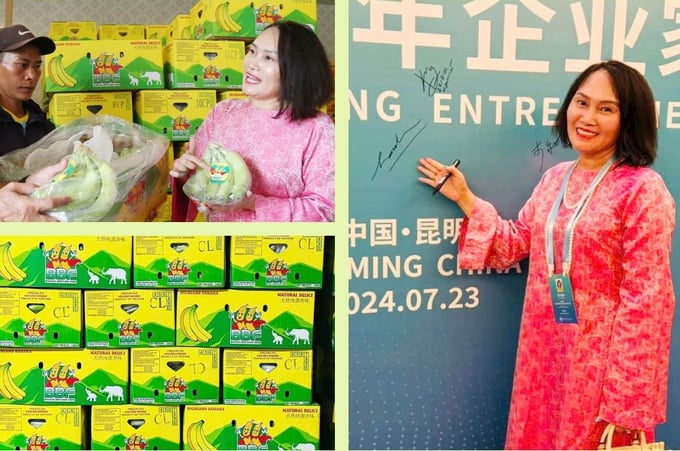
"You can clap your chest proudly that your banana is No. 1, but compared to Ms. Hanh's bananas in Dak Lak, Vietnam, you are still far behind." Photo: Hoang Anh.
Ms. Le Thi My Hanh, General Director of Banana Brothers Farm Joint Stock Company, started her business with about 100 hectares of bananas on the M'Drak plateau of Dak Lak province and chose the Chinese market as the foundation to realize her aspiration to raise the value of Vietnamese bananas.
After 6 years of investing in the Central Highlands, Banana Brothers Farm is currently opening the market to bring Vietnamese bananas to China, South Korea, Japan, Mongolia, etc. Each year, Banana Brothers Farm exports about more than 500 containers and over 10,000 tons of bananas, earning about US$ 3-4 million.
Opening the conversation with Vietnam Agriculture Newspaper, CEO Le Thi My Hanh shared: When we first started our business, like many others, we had to struggle to find markets, partners, and customers. But now, the market is coming to Banana Brothers Farm.
What has created that "position" of Banana Brothers Farm, madam?
CEO Le Thi My Hanh: I think the position Banana Brothers Farm has achieved today comes from the story that we have built trust and brand with customers.
Brand and trust come from product quality. To date, Banana Brothers Farm's products have gone to four countries, including China, South Korea, Japan, and Mongolia. Many other countries, such as the US, European countries, or places considered the "fathers" of the banana industry, such as Ecuador, are also looking to us for cooperation.
This shows that Vietnam's banana industry is at a stage with many advantages and great opportunities to become a key industry of Vietnamese agricultural products. The most important issue is production organization and product quality management to meet market standards. I think that if we have clear planning, a methodical production process, and synchronicity in quality to meet the markets' standards, there will come a time when Vietnamese people "cannot afford" to sell this agricultural product because it is too best-selling.
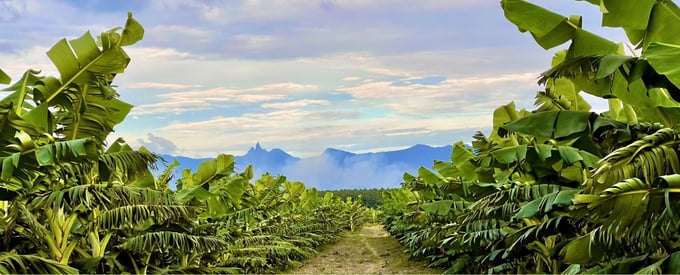
"You 'clap your chest and declare your name' in many other markets, but if you cannot conquer the Chinese market, it is a failure." Photo: Hoang Anh.
Is the quality story also the philosophy that Banana Brothers Farm has persistently pursued over the past 6 years?
CEO Le Thi My Hanh: Since we started our business, we were steadfast in our philosophy and goal of making Vietnamese bananas of the highest quality. Achieving that goal requires clean production processes and high investment costs, especially investment in input materials and application of science and technology to production.
Banana Brothers Farm does not seek markets massively, does not go to fairs, or does mass trade promotion. We start with 1-2 customer partners in 1-2 strategic markets. Reality has proven that that path is correct. After we brought Vietnamese bananas to the Chinese market, we quickly won the trust of consumers and built a brand with our product quality.
The proof is that a "banana king" in Southeast Asia once told me that many customer partners in the Chinese market told him: "You can clap your chest proudly that your banana is No. 1, but compared to Ms. Hanh's bananas in Dak Lak Vietnam, you are still far behind."
Also in the Chinese market, after Banana Brothers Farm confirmed product quality, there were customers who contacted and quickly "closed the order" without checking the raw material area or product quality.
Therefore, brand and trust come from product quality, and quality is brand value. Many customers from China come to us and insist on signing a contract and paying before they can go home.
What do the lessons from the Chinese market suggest to you about the market story of Vietnamese agricultural products?
CEO Le Thi My Hanh: If talking about lessons, I think that whether in the banana industry or any other agricultural product, the most important factor is still product quality. Maybe my thinking will be the opposite to many people with the promotion story, but it's simply that if we do well, the market will come to us. That is quite special in the field of agricultural product export.
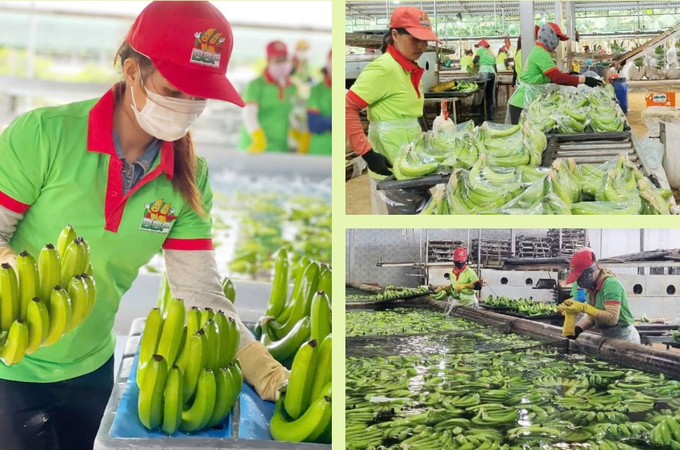
Have we ever wondered why Vietnamese bananas are still cheaper than Philippine bananas? Photo: Hoang Anh.
The potential and advantages of Vietnam's banana industry and many other agricultural products in the Chinese market are extremely large. The most important issue that needs attention is changing thinking. Previously, we used to think that the Chinese market was easy-going, and we had to pay a lot for that wrong thinking. In my opinion, China or Japan, South Korea, the US, the EU, etc., are all the same in the current market context. Some criteria in the Chinese market are even stricter. I think: "In the current context, you make products, 'clap your chest, and declare your name' in many other markets, but if you cannot conquer the Chinese market, it is a failure."
Raising this issue is to change thinking and organize production and processing so that our products can meet the highest standards of the market, especially in a market with many advantages like China.
What is your strategy in the Chinese market and the story of Banana Brothers Farm's market expansion?
CEO Le Thi My Hanh: In the world's consumption trends, bananas are increasingly appreciated for their high nutritional value, especially the old Cavendish banana variety from South America.
Vietnam, a tropical country with soil, climate, natural conditions, and farming and production traditions of an agricultural country, has too many advantages to build a strong banana industry.
For example, bananas in the Central Highlands are assessed as having completely different quality compared to those in other places. That's thanks to the conditions of red basalt soil, underground water rich in minerals, cool water of forests, sunshine and wind of the highlands, etc. All of which blend together to create bananas with a wonderful taste.
That is also the advantage and foundation for Banana Brothers Farm to enhance its competitive advantage in markets, especially the Chinese market. The position of Vietnamese bananas in this market now is not simply a matter of export turnover, but more importantly, more and more customers know the quality banana brand of Vietnam.
They rated the quality of bananas from Vietnam's highlands as higher than that of Cambodia, Laos, and even higher than Chinese bananas from Hainan, Guangxi, and Guangdong. Banana Brothers Farm's bananas are always in the highest segment compared to products from other countries.
Therefore, there are many orders, but Vietnam's high-quality banana output is currently not enough to supply this market, so it is compulsory to divide into each market. Even many of our long-time partners were "sulky" because they have not yet received a supply contract.
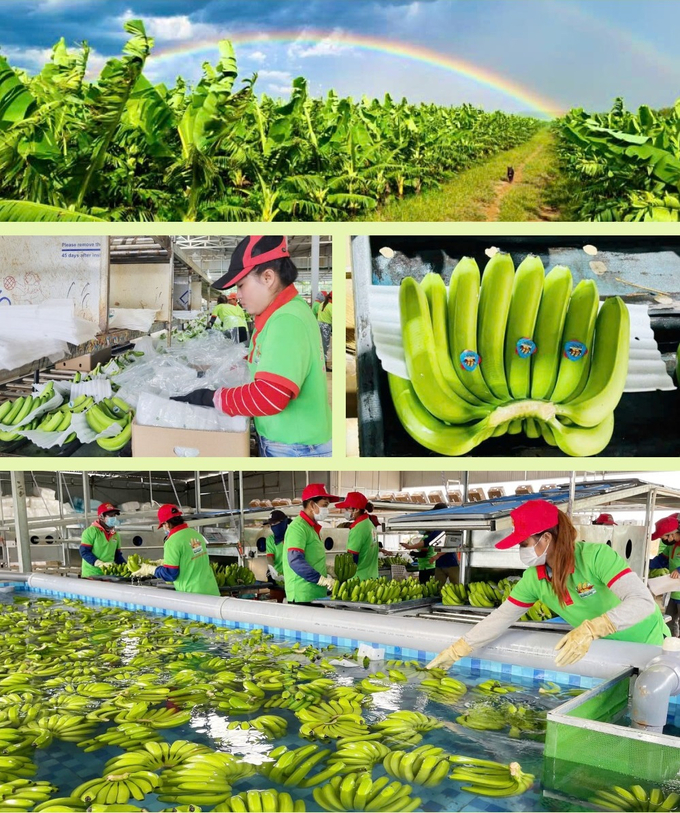
Many of customer partners were "sulky" due to insufficient goods for sale. Photo: Hoang Anh.
Determining China as a large and sustainable market, Banana Brothers Farm is currently expanding an additional 800 hectares of banana growing in Dak Lak. In parallel with producing and processing fresh banana products, we are also researching the issue of deep processing, especially cooperating with partners from Japan to make banana powder, dried bananas, etc.
In addition, there are also many partners proposing Banana Brothers Farm to develop circular agriculture, using banana tree trunks as animal feed and tree bark as fiber. But in the immediate future, we wish to continue to focus on improving product quality so that in China, South Korea, Japan, or any other market, whenever bananas are mentioned, consumers will immediately think of Vietnam.
Can every Banana Brothers Farm make that story? What do you think about the saying, "If you want to go fast, go alone; if you want to go far, go together?"
CEO Le Thi My Hanh: Actually, we have thought a lot about the linkage story. The Ministry of Agriculture and Rural Development as well as some localities always wish Banana Brothers Farm to expand the growing area, build an industry linkage chain, etc. However, I think this is the biggest bottleneck in Vietnam's banana industry.
Have we ever wondered why Vietnamese bananas are still cheaper than Philippine bananas? In my opinion, it's because our way of managing growing areas is not really good or methodical. There is no synchronized production process and no set of product quality standards, leading to uneven quality of Vietnamese bananas. That greatly affects the product brand and the image of Vietnamese bananas. Therefore, with Banana Brothers Farm's strategy, we wish to put quality on top and then gradually consider the linkage story.
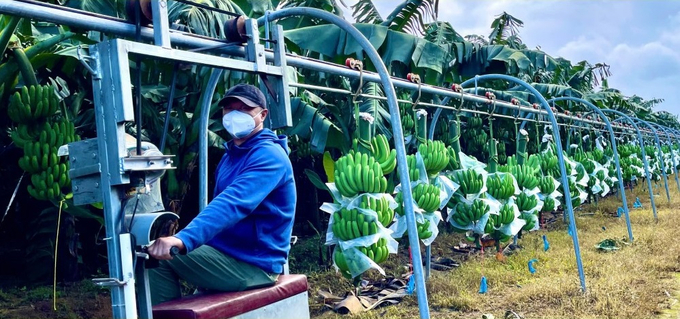
Product quality is the connecting glue, the central nucleus of the chain. Photo: Hoang Anh.
What about the story of linking between businesses in the banana industry, madam? Especially in the context that we are building a national brand for Vietnamese agricultural products?
CEO Le Thi My Hanh: I always think that the national brand of agricultural products is connecting the brand value of businesses, connecting the value of linkage chains, and is the synery of the entire industry community. This is no longer a story of this business or this locality, but the common pride of all Vietnamese people.
That connection must have a "glue," which is product quality. In other words, if product quality is taken as the core value, the center of the linkage chain, the story of joining forces and going together will be more favorable. To do so, it is necessary to have planning, policies, and a set of solutions for production processes and quality standards that are truly synchronious, rather than everyone doing things spontaneously like in the past.
I believe that with the potential, advantages, and increasingly expanding market demand, Vietnam's banana industry will realize that story.
Thank you, madam!
Translated by Thu Huyen

(VAN) Japan's efforts to lower the price of rice through the release of its stockpile may finally be making some progress, albeit at a snail's pace.

(VAN) U.S. tariffs are not only a 'shock', but also an opportunity for Vietnamese businesses to renew their mindset toward comprehensive development.

(VAN) As Bac Giang lychee enters the harvest season, Minister Do Duc Duy expects that the fruit will contribute greatly to agricultural exports due to standardized production and deep processing.

(VAN) Consumers have shown a preference for free-range eggs, but those farming systems are more vulnerable to biosecurity risks like bird flu.
/2025/05/09/5701-1-184335_301.jpg)
(VAN) Vietnam’s eel exports nearly doubled thanks to a mud-free farming model, opening up new prospects while still facing numerous barriers related to international standards.

(VAN) Minister Do Duc Duy warned that if production is not professionalized and supply chains are not transparent, the U.S. market could become a growth bottleneck.
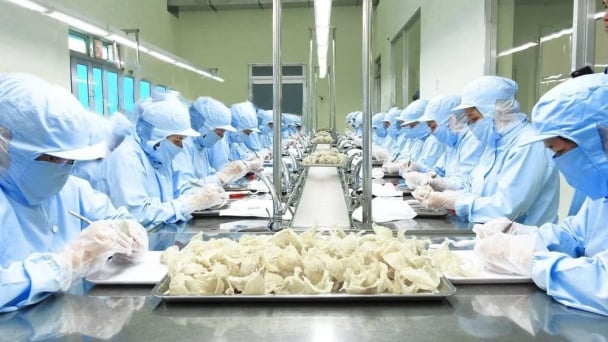
(VAN) Delegating surveillance responsibilities to local authorities is a cost-saving and efficiency-boosting measure that removes a key bottleneck for enterprises, according to Director General Duong Tat Thang.